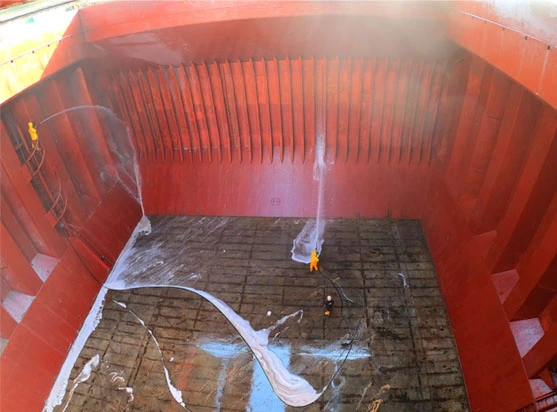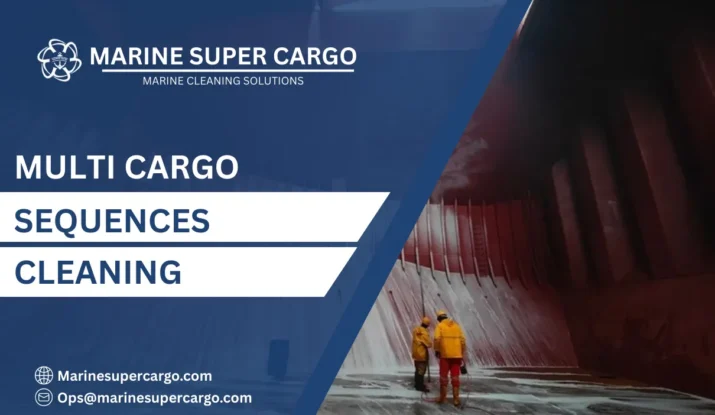Multi cargo sequences cleaning represents critical operational challenges for bulk carrier vessels handling diverse chemical and mineral cargoes. These complex decontamination procedures ensure safe transitions between incompatible materials throughout cargo hold operations. Understanding multi cargo sequences cleaning requirements is essential for preventing cross-contamination and maintaining vessel operational efficiency.
The transportation of incompatible cargoes creates persistent residue complications that affect cargo hold integrity from bow to stern compartments. Multi cargo sequences cleaning demands immediate professional intervention with comprehensive decontamination protocols. These operations prevent dangerous chemical reactions and ensure safe loading of subsequent cargoes throughout vessel spaces.
Multi cargo sequences cleaning affects all sections of bulk carriers, particularly port and starboard hold surfaces where residue accumulation is most severe. The complex nature of cargo transitions requires specialized handling protocols for different material combinations. Forward holds near the forecastle often experience more challenging multi cargo sequences cleaning due to ventilation limitations and structural complexity
READ MORE : Multi-Cargo Hold Cleaning Fujairah
Understanding Incompatible Cargo Contamination Risks
Multi cargo sequences cleaning involves managing diverse chemical interactions that create severe contamination scenarios in bulk carrier operations. Different cargo materials leave specific residues that can react dangerously with subsequent loads, creating toxic gases, corrosive solutions, or explosive conditions. These microscopic particles penetrate into structural recesses and create persistent contamination zones.
The chemical compatibility challenges of multi cargo sequences cleaning require detailed analysis of cargo transition protocols throughout vessel operations. Port-side holds often experience different contamination patterns due to loading equipment positioning and atmospheric exposure. Starboard compartments may show varying residue characteristics based on discharge procedures and ventilation effectiveness.
Cargo interaction risks create immediate safety hazards when incompatible materials contact existing residues. Multi cargo sequences cleaning must address potential reactions between acidic and alkaline materials, oxidizing agents and organic compounds, or metals and corrosive chemicals. Aft sections near machinery spaces require particular attention due to elevated temperatures that accelerate chemical reactions.
MARPOL and IMO Regulatory Compliance Framework
The International Maritime Organization (IMO) establishes comprehensive guidelines for managing hazardous cargo transitions and contamination prevention requirements. MARPOL Annex II specifically addresses chemical cargo residue management protocols for multi cargo sequences cleaning operations.
Multi cargo sequences cleaning must comply with international safety standards for hazardous material handling and cross-contamination prevention. All decontamination operations require proper documentation and certified cleaning procedures. The IMO mandates detailed cargo transition protocols and emergency response procedures for incompatible material scenarios.
International safety regulations require specialized treatment of mixed cargo residues generated during multi cargo sequences cleaning operations. Vessel operators must maintain comprehensive material compatibility databases and emergency response capabilities. MARPOL environmental requirements demand certified disposal of all contaminated cleaning materials through approved facilities.

Professional Cleaning Solutions by Marine Super Cargo
Marine Super Cargo specializes in multi cargo sequences cleaning through advanced compatibility analysis and specialized decontamination methodologies. Our certified chemical cleaning teams understand the complex requirements for managing cargo transitions and maintain strict adherence to international safety standards.
Our comprehensive approach includes detailed cargo compatibility assessments throughout all vessel operations to prevent dangerous interactions. We utilize specialized decontamination systems and neutralization protocols designed for multi cargo sequences cleaning requirements. Our teams coordinate closely with vessel crews to ensure complete safety protocol implementation.
Marine Super Cargo employs certified hazmat specialists who understand the complex requirements for incompatible cargo cleaning operations. We maintain emergency response protocols and specialized treatment capabilities throughout all decontamination activities. Our safety-first approach ensures regulatory compliance while achieving complete multi cargo sequences cleaning success.
Contamination Prevention and Safety Management
Bulk carriers face severe operational complications when managing multi cargo sequences cleaning between incompatible materials. Cross-contamination creates immediate safety hazards including toxic gas generation, corrosive damage, and potential explosive conditions. Chemical residue interactions require continuous monitoring and specialized neutralization procedures.
Forward cargo holds often display more complex contamination patterns due to atmospheric exposure and structural configuration. Aft compartments near engine room areas may experience elevated reaction rates due to temperature variations. Multi cargo sequences cleaning protocols must address varying environmental conditions throughout vessel cargo spaces.
Professional safety management addresses these hazards through comprehensive risk assessment and continuous monitoring systems. Emergency response teams must be immediately available throughout multi cargo sequences cleaning operations. Specialized decontamination procedures safely manage mixed residues while protecting personnel and vessel systems.
Advanced Decontamination Technologies and Methods
Modern multi cargo sequences cleaning approaches emphasize comprehensive contamination analysis and targeted decontamination strategies. Chemical compatibility databases guide proper cleaning agent selection and neutralization procedures. Atmospheric monitoring systems detect hazardous gas formation during cargo transition operations.
Cargo sequence planning plays a crucial role in minimizing multi cargo sequences cleaning complexity and safety risks. Understanding material compatibility characteristics enables proper transition scheduling and preventive protocol implementation. Specialized equipment ensures effective residue removal while preventing cross-contamination throughout vessel operations.
Marine Super Cargo provides comprehensive cargo transition management programs designed to minimize contamination risks. Our services include compatibility analysis, specialized decontamination equipment, and emergency response planning for multi cargo sequences cleaning operations.
Industry Standards and Operational Excellence
Maritime industry standards for multi cargo sequences cleaning continue evolving with improved decontamination technologies and safety monitoring approaches. Modern bulk carriers incorporate enhanced ventilation systems and automated contamination detection. These innovations help reduce transition risks and improve operational safety capabilities.
Safety protocols must balance thorough decontamination with operational efficiency requirements. Proper cargo scheduling ensures regulatory compliance while maintaining vessel productivity. Multi cargo sequences cleaning management requires coordination between safety officers, chemical specialists, and certified cleaning contractors.
International safety regulations demand strict compliance with hazardous material transition standards and emergency response requirements. Marine Super Cargo facilitates regulatory compliance through comprehensive safety management systems that ensure personnel protection and operational success.
Frequently Asked Questions
Q1: What risks occur when incompatible cargoes contact existing residues?
A: Incompatible cargo contact can generate toxic gases, create corrosive solutions, cause explosive reactions, or produce hazardous chemical compounds requiring immediate emergency response procedures.
Q2: How long does multi cargo sequences cleaning typically require?
A: Cleaning duration depends on cargo compatibility, contamination severity, and hold size, typically ranging from 12-48 hours with proper decontamination protocols and equipment.
Q3: What specialized equipment is needed for cargo transition cleaning?
A: Atmospheric monitoring systems, chemical neutralization equipment, specialized cleaning agents, contamination detection instruments, and emergency response gear are essential for safe operations.
Q4: How does MARPOL regulate mixed cargo residue disposal?
A: All mixed cargo residues require proper characterization, neutralization, and disposal at certified hazardous waste facilities with complete documentation according to environmental protection standards.
Q5: What preventive measures minimize cargo compatibility issues?
A: Comprehensive cargo sequencing, material compatibility analysis, enhanced cleaning protocols, atmospheric monitoring, and proper residue management prevent cross-contamination problems.
For professional bulk carrier hold cleaning services specializing in cargo transition operations, contact Marine Super Cargo today. Our certified specialists ensure complete safety protection while maintaining MARPOL compliance and operational excellence.


